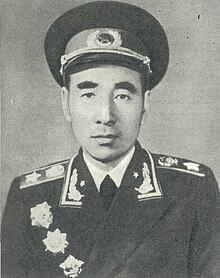
Back Lin Biao Afrikaans لين بياو Arabic لين بياو ARZ Лінь Бяа Byelorussian লিন পিয়াও Bengali/Bangla Lin Biao Breton Lin Biao Catalan Lin Piao Czech Lin Biao German Lin Biao Esperanto
Lin Biao | |
|---|---|
林彪 | |
 | |
| Vice Chairman of the Chinese Communist Party | |
| In office 25 May 1958 – 13 September 1971 | |
| Chairman | Mao Zedong |
| First Vice Chairman of the Chinese Communist Party | |
| In office 1 August 1966 – 13 September 1971 | |
| Chairman | Mao Zedong |
| Preceded by | Liu Shaoqi |
| Succeeded by | Zhou Enlai (1973) |
| 2nd First Vice Premier of the People's Republic of China | |
| In office 21 December 1964 – 13 September 1971 | |
| Premier | Zhou Enlai |
| Preceded by | Chen Yun |
| Succeeded by | Deng Xiaoping |
| Vice Premier of the People's Republic of China | |
| In office 15 September 1954 – 13 September 1971 | |
| Premier | Zhou Enlai |
| 2nd Minister of National Defense | |
| In office 17 September 1959 – 13 September 1971 | |
| Premier | Zhou Enlai |
| Preceded by | Peng Dehuai |
| Succeeded by | Ye Jianying |
| Personal details | |
| Born | Lin Yurong 5 December 1907 Huanggang, Hubei, Qing Empire |
| Died | 13 September 1971 (aged 63) Öndörkhaan, Mongolian People's Republic |
| Political party | Chinese Communist Party (1927–1971) |
| Spouse(s) | Zhang Mei [zh] (1937–42) Ye Qun (1942–71) |
| Children | Lin Xiaolin [zh] (daughter) Lin Liguo (son) Lin Liheng (daughter) |
| Alma mater | Whampoa Military Academy |
| Nicknames |
|
| Military service | |
| Allegiance | People's Republic of China |
| Branch/service | |
| Years of service | 1925–1971 |
| Rank | |
| Commands |
|
| Awards |
|
| Lin Biao | |||||||||||||||||||||||
|---|---|---|---|---|---|---|---|---|---|---|---|---|---|---|---|---|---|---|---|---|---|---|---|
 "Lin Biao" in regular Chinese characters | |||||||||||||||||||||||
| Chinese | 林彪 | ||||||||||||||||||||||
| |||||||||||||||||||||||
Lin Biao (Chinese: 林彪; 5 December 1907 – 13 September 1971) was a Chinese politician and Marshal of the People's Republic of China who was pivotal in the Communist victory during the Chinese Civil War, especially in Northeast China from 1946 to 1949. Lin was the general who commanded the decisive Liaoshen and Pingjin campaigns, in which he co-led the Manchurian Field Army to victory and led the People's Liberation Army into Beijing. He crossed the Yangtze River in 1949, decisively defeated the Kuomintang and took control of the coastal provinces in Southeast China. He ranked third among the Ten Marshals. Zhu De and Peng Dehuai were considered senior to Lin, and Lin ranked directly ahead of He Long and Liu Bocheng.
Lin abstained from taking an active role in politics after the war ceased in 1949. He led a section of the government's civil bureaucracy as one of the co-serving Vice Premiers of the People's Republic of China from 1954 onwards, becoming First Vice Premier from 1964. Lin became more active in politics when named one of the co-serving Vice Chairmen of the Chinese Communist Party in 1958. He held the three responsibilities of Vice Premier, Vice Chairman and Minister of National Defense from 1959 onwards. To date, Lin is the longest serving Minister of National Defense of the People's Republic of China. Lin became instrumental in creating the foundations for Mao Zedong's cult of personality in the early 1960s, and was rewarded for his service in the Cultural Revolution by being named Mao's designated successor as the sole Vice Chairman of the Chinese Communist Party, from 1966 until his death.
Lin died on 13 September 1971, when a Hawker Siddeley Trident he was aboard crashed in Öndörkhaan in Mongolia. The exact events of this "Lin Biao incident" have been a source of speculation ever since. The Chinese government's official explanation is that Lin and his family attempted to flee following a botched coup against Mao. Others have argued that they fled out of fear they would be purged, as Lin's relationship with other Communist Party leaders had soured in the final few years of his life. Following Lin's death, he was officially condemned as a traitor by the Communist Party. Since the late 1970s, Lin and the wife of Mao, Jiang Qing, (along with the other members of the Gang of Four) have been labeled the two major "counter-revolutionary forces" of the Cultural Revolution, receiving official blame from the Chinese government for the worst excesses of that period.
© MMXXIII Rich X Search. We shall prevail. All rights reserved. Rich X Search